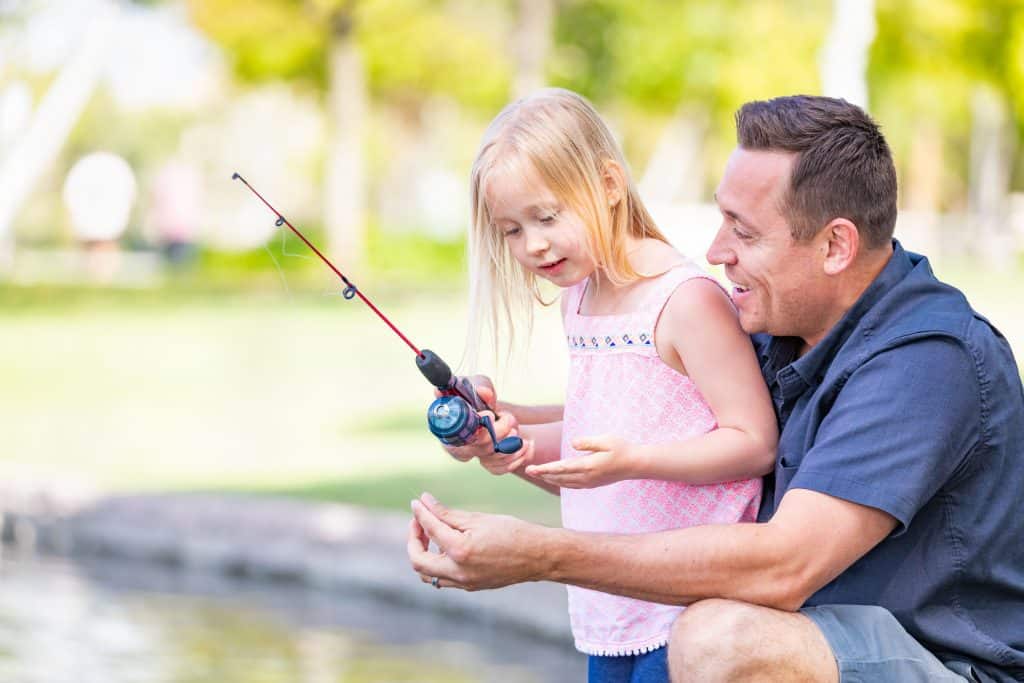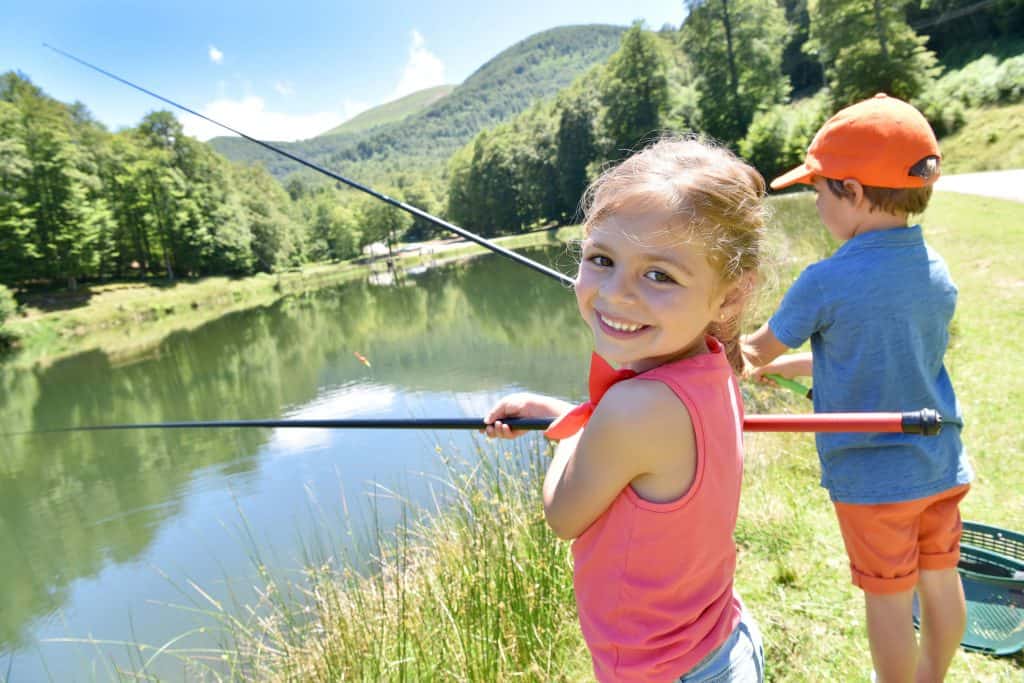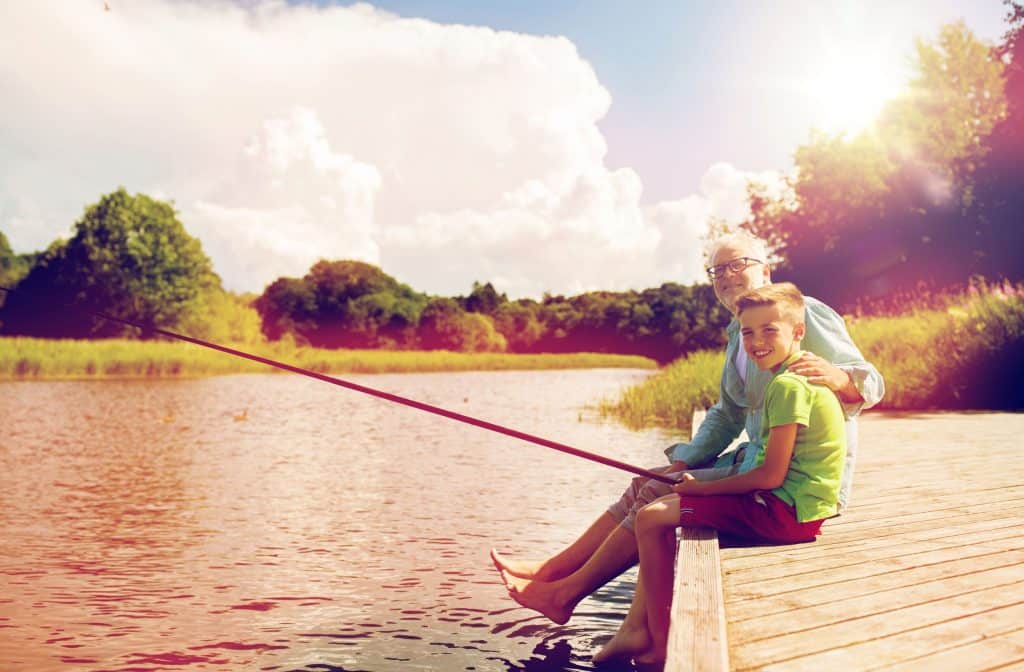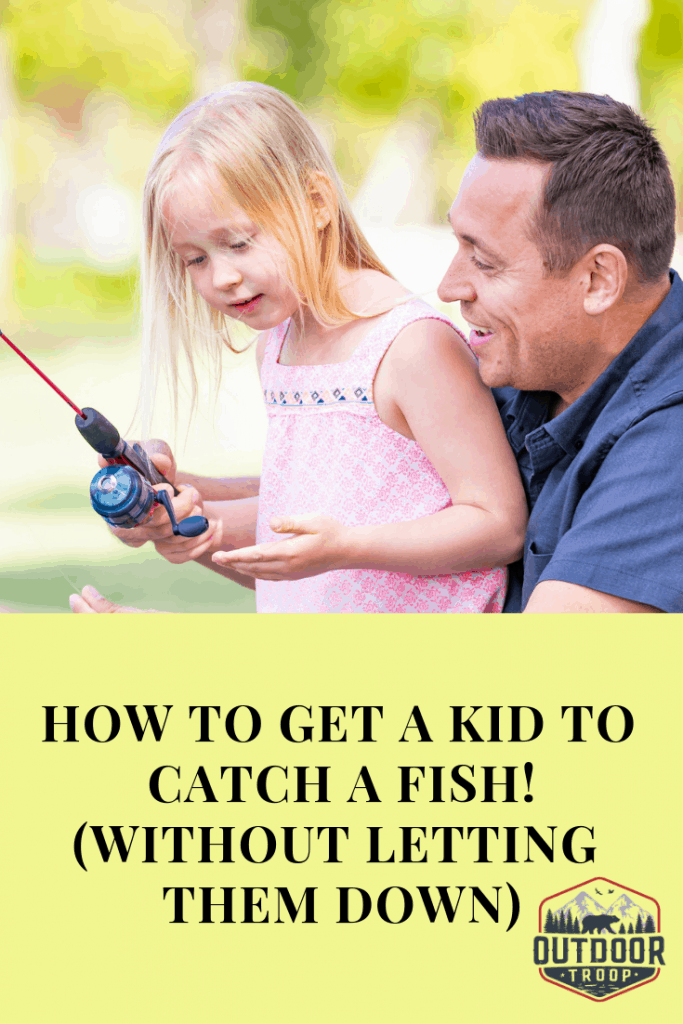
As a kid I made many great memories fishing at the lake with my family. Now that I am older and am getting close to starting my own family, I have started to do some research on how to get a kid to catch a fish without letting them down.
What is the best way to help a child catch a fish, without letting them down? The best way to help a kid catch fish without upsetting them is to teach them fishing basics, be patient, and encourage them throughout the entire process. It also helps to get them equipped with the proper gear and practice with them in the right locations.
Through all of my research, I have found 7 easy ways to not only help kids catch fish but also help them develop a deep love and respect for fishing. Keep reading to dive into each of these 7 techniques that will change your kid’s entire view on fishing without any frustration.
7 Tips to Get a Kid to Catch a Fish
1. Patience
This first tip to get a kid to catch a fish is probably not what you would guess. It is the principle of patience. Anyone who has ever fished before knows that fishing isn’t always the most action-packed activity.
I have many memories of fishing as a kid that were fantastic, while others were simply boring and frustrating. If I would have understood the principle of
Looking back, I also would have been able to catch many, many more fish if I had learned how to be patient. I remember giving up after just a few minutes, not knowing that sometimes even seconds later I would have had a fish on my hook.
This resulted in many missed opportunities when I left the lake with nothing more than the feeling of being let down.
Many experienced fishermen agree that it was patience that resulted in their most successful fishing trips.
Kids need to not only understand and learn this principle for themselves, but they have to see it through their teachers. If their teacher, whether it be their dad, grandpa, or friend, is short-tempered and pessimistic they may begin to develop those same traits while fishing.
It won’t take long for them to become the same way. When they are out on the lake and not getting any fish to bite, they will probably have an awful experience. Not only will they feel let down, but they may disregard fishing entirely.
That is why it is vital to teach kids that patience is essential to have success in fishing. Encourage them so that they will continue to be optimistic despite the low (or nonexistent) amount of fish that have been caught.
If a kid feels encouraged and supported they won’t feel the pressure and stress that comes to many when there is a bad fishing day.
Patience will lead to more successful catches over time. But even if they continue to have bad luck, if a kid understands this principle, they won’t leave the lake feeling let down. They can even carry this habit with them for the rest of their lives.
2. Teach them the Basics
Once kids understand patience and know that they have a loving and supportive teacher, no matter how many fish are in their basket, then it is time to teach the kids the basics of fishing.
When one understands the general rules and basics, there is a higher chance that they will enjoy it and become skilled at it in a shorter period of time! This is true for any activity, and fishing is no exception.
It is important to teach your kids about what fishing is. If they have never gone before, they might not even understand how the hobby even works. Teach them about the equipment that is used and what purposes it serves.
It is also a good idea to educate them about the different types and sizes of common fish.
Remember that kids are inexperienced and that there are tons of terms that experienced fishermen use that will go in one ear and out the other. To make sure you can communicate effectively, teach kids about some basic fishing terminology.
I remember as a kid I didn’t know what sinkers or bobbers were, or what they were used for. If I knew that, I could have used them to my advantage and had more success.
Don’t be afraid to dumb things down. They are kids after all and they need to learn the simple things first before they can get a good grasp on the more advanced things.
Once they really get it, they will know exactly what needs to be done. Learning the fishing basics is a good step to helping anyone catch fish.
Once they have learned and understood fishing basics, kids are ready to be shown those basics. Kids learn so much from the examples of others. As they watch you fish, they will learn what it takes to be a successful fisherman.
3. Get the Right Gear

Once your kid has a basic understanding of what fishing is, then it’s time to pick out some gear for them. Everyone loves getting new things, so this will help motivate any kid to go fishing and have a good time.
Getting the right gear that fits a kid’s size and strength will also greatly increase their chances of catching a fish. For example, if a pole is too long and heavy, there is no way a kid will be able to reel in anything.
Below is a list of some very basic gear that will benefit any kid while they’re fishing:
- Fishing Pole- A fishing pole is
the first and obviously most important thing that a kid needs in order to fish. There are tons of different types and sizes of fishing poles to choose from. There are definitely some that are more recommended than others, but anything that seems to fit their size should be fine. Here are three of my favorite fishing poles for you to take into consideration:
- Shakespeare Ugly Stik G2– This rod is very dependable and strong. Is priced at about $50.00
- Zebco 202 Flatboard– This pole conveniently comes with 10 lbs of pre-spooled fishing line so no time is wasted. It runs for about $20.00.
- Kids Caster Jimmy Houston– This pole is great for learning the very basics because it comes with plastics hooks for casting practice. It ranges from $25.00.
- Bobbers- These are perfect for kids to have and utilize. Bobbers bob up and down in the water when fish are biting on the hook. This is exciting for every kid to see. It gives them something to look at and keep track of in the water, while also letting them know when to start reeling in before it is too late.
- Sinkers- These simply help the hook get lower in the water, which will help it reach the area where most of the fish hang out. A kid might not be getting any bites on their hook because it is hanging out on the water’s surface. Always have sinkers in your tackle box to increase your kid’s chances.
- Plastic Worms and Bait- It is essential to always have plenty of worms and bait in your tackle box. If you run out during a fishing trip there might not be much else that you can do.
- Sunscreen- If a kid gets a really bad burn on a fishing trip, there’s a good chance they aren’t going to catch very
many fish. They’ll also be in a lot of pain and discomfort! Always be sure to protect your kids from the sun. - Extra Supplies- It is smart to have backup and extra supplies for your kid. Bring an extra pole, extra bait, spare hooks, and bobbers, etc. That way, no matter what happens, you don’t have to worry about running out of the basics for your kid.
4. Get to the Right Spot
When I was young, I went with my family to countless different lakes. Some were definitely better for fishing than others. Some didn’t seem to have any fish at all!
Do some research before you plan your trip so that you know you are going to a place that has a sufficient amount of fish. Many times I had a blast because my parents had taken me to the perfect fishing spot. Other times, not a single person on the lake had a nibble.
If you want your kid to catch fish and not get discouraged, location is key. It is easy to go online and look at reviews of lakes and rivers to see what previous people have experienced. With a little bit of research, you are sure to go to the best place where you kids can catch all the fish they could ever need.
Another thing to keep in mind is that if you are out with a kid who wants to catch fish, it is a good idea to go to smaller lakes, streams, and rivers. Kids aren’t usually looking to catch the biggest fish, they just want to catch something and have a good time.
If you take them to smaller areas, it’s easy to catch lots of little fish and have a good trip.
5. Use the Right Baits and Lures
Another important thing to bring is the proper bait and lures for your situation. There are some baits that are also pretty universal and can be used for virtually any type of fish.
I made a list of some of the most simple baits that any kid can use to catch a fish:
- Bread- This seems so simple, and that is because it is. All you need is a fresh loaf and you can catch ridiculous amounts of fish. Ball up little pieces of bread and put it on your kid’s hook and you’ll be amazed at how well it will work.
- Worms- This is the classic way to fish. Every fisherman has caught a fish with a worm before. Just like using bread, this is another cheap yet effective way to help your kids catch tons of fish. Fish see the live worms and just can’t help themselves.
- Plastic Worms- Plastic worms are just about as good as live ones and you can buy them in bulk and save some money. Depending on your kid this may be a better option than live worms if they find them gross. On the other hand, many kids love worms so do whatever works for you!
- Curly Tail Grub- This is another good, cheap option for beginners and kids. The Curly Tail Grub is a man-made greenish worm that is put on a hook. Fish love because they look and smell so unique. Definitely another great thing to have in your kid’s tackle box.
As mentioned above, the right bait in the right lake will attract the right fish. If you use these basic baits, your kid should be good to go in just about any smaller lake, river, or stream.
6. Teach Them Techniques

Now that you’ve got everything else out of the way, you are ready to start fishing. There are some techniques that are just so simple and effective, they will help any kid catch fish and have a good time.
The Bread Bait Technique- This technique is effective and so easy to pull off you can guarantee a fish-filled day for your kid.
One of the first things you want to do is bring a loaf of bread and start chumming the water. Fishers of all experience levels do this around the world. The idea is that if you throw a bunch of extra bait into the water the fish will get anxious and start a feeding frenzy.
Tear up the crust of a few slices of bread and toss them in a targeted area in the water. Give it a minute or two while you watch the fish attack the bait in the water. Once it slows down the fish will be excited for more. They will already trust it, thinking that it is a safe food source.
This is the perfect moment to help your kid cast their line right in the middle of the area where you threw the bread crumbs. I watched videos of people doing this on YouTube and was amazed to see just how quickly fish bit down on the hook.
Sometimes five seconds hadn’t even passed before kids were reeling in fish.
Catching fish like this will motivate any kid to love fishing.
Chumming the water- This technique can be used for more than just bread. It doesn’t matter where you are, always bring some extra cheap bait when fishing with a kid. They will love throwing it out into the lake and it will cause the fish to get anxious and bite anything they see. This, in my opinion, is the best way to catch the most amount of fish in smaller amounts of time.
(However, make sure that chumming is legal in your area. Sometimes there are areas where chumming or the use of certain kinds of bait is forbidden.)
Casting- Casting a line into the lake can be very frustrating and takes a while for anyone, especially a kid, to learn properly. It is wise to help your kid cast their line. Show them the basics and techniques that you use. Do what it takes to get their line out in the water where it needs to be. At the end of the day, all they really care about is if they reel in a fish, not if they could cast a line or not.
7. What to Do When a Fish is Caught
Now that a fish has been caught, it is important not to let the kid handle it if they don’t want to. Many fish have weird textures and defensive spines. If a kid touches something like that or gets cut, they could get very upset and lose interest altogether.
For their safety, it may be wise to handle the fish yourself. This is a great learning opportunity while kids watch their teacher handle the fish. Show them how to take the hook out of the fish’s mouth. This could be a very interesting and edifying experience to them.
Many kids might not like the idea of killing fish. If that’s the case, don’t worry about it! Show them how to release the fish back into the lake. Many kids love the feeling of putting the fish back in its home.
I’ve known many who lost interest in fishing while they were young because they hated watching fish be “tortured” or “killed”.
Why Go Fishing With Your Kids
Over 40 million people fish in the United States every year. It is one of the most common hobbies and past times. For me personally, I have some very fond memories of fishing with my dad, uncle, and grandpa. It is a great way for a parent to bond with their kinds.
Through it, they can develop many memories and learn skills that they can use in their future.
One day, they will even look back and be glad that their parents, grandparents, or others took them out to the lake and taught them how to fish. They will then be able to do the same for their kids.
Related Questions
How old should my kids be for me to start teaching them fishing? A good age to start teaching your kids how to fish is anywhere between 3-5 years old. This is when they really start wanted to explore new things and ideas. At this age, they will enjoy it and have no problem picking up the basics quickly.
Can a kid fish without a license?Children under the age of 16 generally do not need a license to fish, however, the are expected to follow the same fishing regulations. They also do not need to be accompanied by a licensed adult to be able to fish.

